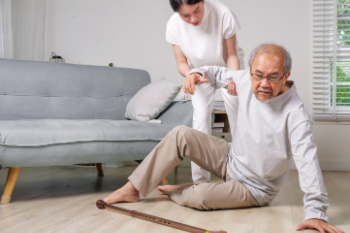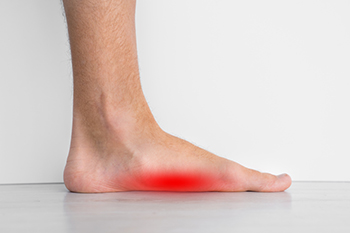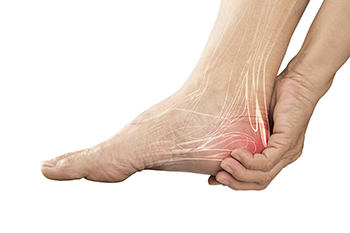Items filtered by date: August 2024
Causes of Falling and Prevention Methods

Falls can be caused by various factors such as slippery surfaces, poor lighting, and obstacles like loose rugs. Medical conditions, such as dizziness or visual impairments, as well as certain medications, can also increase fall risk. Effective fall prevention involves the 4Ps, which are pain, position, placement, and personal needs. Pain management is essential, as discomfort can affect balance and mobility. Positioning oneself carefully, especially when standing up or moving, helps maintain stability. Proper placement of furniture and other items ensures that pathways are clear and safe. Finally, addressing personal needs such as regular exercise to strengthen muscles and managing health conditions can further reduce the risk of falls. Falling can seriously impact the feet. If you have fallen and have foot pain, it is suggested that you visit a podiatrist who can offer you effective relief and treatment solutions.
Preventing falls among the elderly is very important. If you are older and have fallen or fear that you are prone to falling, consult with one of our podiatrists from North Penn Podiatry. Our doctors will assess your condition and provide you with quality advice and care.
Every 11 seconds, an elderly American is being treated in an emergency room for a fall related injury. Falls are the leading cause of head and hip injuries for those 65 and older. Due to decreases in strength, balance, senses, and lack of awareness, elderly persons are very susceptible to falling. Thankfully, there are a number of things older persons can do to prevent falls.
How to Prevent Falls
Some effective methods that older persons can do to prevent falls include:
- Enrolling in strength and balance exercise program to increase balance and strength
- Periodically having your sight and hearing checked
- Discuss any medications you have with a doctor to see if it increases the risk of falling
- Clearing the house of falling hazards and installing devices like grab bars and railings
- Utilizing a walker or cane
- Wearing shoes that provide good support and cushioning
- Talking to family members about falling and increasing awareness
Falling can be a traumatic and embarrassing experience for elderly persons; this can make them less willing to leave the house, and less willing to talk to someone about their fears of falling. Doing such things, however, will increase the likelihood of tripping or losing one’s balance. Knowing the causes of falling and how to prevent them is the best way to mitigate the risk of serious injury.
If you have any questions, please feel free to contact our offices located in Lansdale, and King of Prussia, PA . We offer the newest diagnostic and treatment technologies for all your foot care needs.
Are You Suffering From Ingrown Toenails?
Impacts of Flat Feet on All Ages

Flat feet, or fallen arches, occur when the arch of the foot collapses, leading to the entire foot making contact with the ground. Symptoms can include foot pain, swelling, and difficulty standing for long periods of time. Causes can range from genetic factors to injury or conditions such as arthritis. In children, flat feet are often a normal part of development, usually improving with age. However, if persistent, they may require intervention. In adults, flat feet can result from wear and tear, obesity, or excessive strain. Both children and adults may experience discomfort or difficulty in activities. Treatment options include wearing supportive footwear, using orthotics, and doing exercises to strengthen the foot muscles. If you or your child has flat feet, it is suggested that a podiatrist is consulted and regular visits are scheduled to help manage this condition.
Flatfoot is a condition many people suffer from. If you have flat feet, contact one of our podiatrists from North Penn Podiatry. Our doctors will treat your foot and ankle needs.
What Are Flat Feet?
Flatfoot is a condition in which the arch of the foot is depressed and the sole of the foot is almost completely in contact with the ground. About 20-30% of the population generally has flat feet because their arches never formed during growth.
Conditions & Problems:
Having flat feet makes it difficult to run or walk because of the stress placed on the ankles.
Alignment – The general alignment of your legs can be disrupted, because the ankles move inward which can cause major discomfort.
Knees – If you have complications with your knees, flat feet can be a contributor to arthritis in that area.
Symptoms
- Pain around the heel or arch area
- Trouble standing on the tip toe
- Swelling around the inside of the ankle
- Flat look to one or both feet
- Having your shoes feel uneven when worn
Treatment
If you are experiencing pain and stress on the foot you may weaken the posterior tibial tendon, which runs around the inside of the ankle.
If you have any questions please feel free to contact our offices located in Lansdale, and King of Prussia, PA . We offer the newest diagnostic and treatment technologies for all your foot and ankle needs.
Heel Pad Syndrome
 Heel pad syndrome is a painful condition affecting the heel's fatty tissue, leading to discomfort and difficulty walking. This syndrome occurs when the heel's fat pad, which acts as a shock absorber, deteriorates or thins out, often due to excessive stress or injury. The condition can result from aging, repetitive high-impact activities like running or jumping, prolonged standing, or being overweight. Heel pad syndrome can affect anyone but is more common among athletes, older adults, and individuals with occupations requiring extended periods of time on their feet. Symptoms typically include a deep, bruised feeling in the heel, particularly noticeable during weight-bearing activities. This pain can be sharp or aching, worsening with activity and improving with rest. If you have painful heels, it is suggested that you schedule an appointment with a podiatrist who may prescribe orthotics, heel cups, specific exercises, and anti-inflammatory medication.
Heel pad syndrome is a painful condition affecting the heel's fatty tissue, leading to discomfort and difficulty walking. This syndrome occurs when the heel's fat pad, which acts as a shock absorber, deteriorates or thins out, often due to excessive stress or injury. The condition can result from aging, repetitive high-impact activities like running or jumping, prolonged standing, or being overweight. Heel pad syndrome can affect anyone but is more common among athletes, older adults, and individuals with occupations requiring extended periods of time on their feet. Symptoms typically include a deep, bruised feeling in the heel, particularly noticeable during weight-bearing activities. This pain can be sharp or aching, worsening with activity and improving with rest. If you have painful heels, it is suggested that you schedule an appointment with a podiatrist who may prescribe orthotics, heel cups, specific exercises, and anti-inflammatory medication.
Many people suffer from bouts of heel pain. For more information, contact one of our podiatrists of North Penn Podiatry. Our doctors can provide the care you need to keep you pain-free and on your feet.
Causes of Heel Pain
Heel pain is often associated with plantar fasciitis. The plantar fascia is a band of tissues that extends along the bottom of the foot. A rip or tear in this ligament can cause inflammation of the tissue.
Achilles tendonitis is another cause of heel pain. Inflammation of the Achilles tendon will cause pain from fractures and muscle tearing. Lack of flexibility is also another symptom.
Heel spurs are another cause of pain. When the tissues of the plantar fascia undergo a great deal of stress, it can lead to ligament separation from the heel bone, causing heel spurs.
Why Might Heel Pain Occur?
- Wearing ill-fitting shoes
- Wearing non-supportive shoes
- Weight change
- Excessive running
Treatments
Heel pain should be treated as soon as possible for immediate results. Keeping your feet in a stress-free environment will help. If you suffer from Achilles tendonitis or plantar fasciitis, applying ice will reduce the swelling. Stretching before an exercise like running will help the muscles. Using all these tips will help make heel pain a condition of the past.
If you have any questions please contact our offices located in Lansdale, and King of Prussia, PA . We offer the newest diagnostic and treatment technologies for all your foot and ankle needs.
Causes and Treatment of Corns on the Feet

Corns on the feet can stem from various factors, with age being one of them. As people grow older, their feet undergo physical and biomechanical changes. These can affect how they function and alter the way you walk, potentially leading to corns. WearingiIll-fitting socks can also contribute to corns on the feet. Too large socks may slip and cause friction, while tight socks can irritate the skin. Shoes that do not fit properly, especially high-heeled or narrow shoes, whether too big or too small, can cause friction and pressure, causing a corn to develop. Obesity can alter your gait and weight distribution, often resulting in foot deformities like flat feet, which in turn make corns more likely to develop. Hammertoes or bunions exert unusual pressure on parts of the foot, promoting corn formation. A podiatrist can treat a foot corn by trimming the skin with a sharp tool to remove the outer layers of the corn. Another option is corn reduction, which calls for cutting away excess bone, repositioning larger bones, or attaching joints. In some cases, a cortisone injection directly into the corn can provide significant relief. If you are suffering from the pain of corns on the feet, it is suggested that you schedule an appointment with a podiatrist.
Corns can make walking very painful and should be treated immediately. If you have questions regarding your feet and ankles, contact one of our podiatrists of North Penn Podiatry. Our doctors will treat your foot and ankle needs.
Corns: What Are They? And How Do You Get Rid of Them?
Corns are thickened areas on the skin that can become painful. They are caused by excessive pressure and friction on the skin. Corns press into the deeper layers of the skin and are usually round in shape.
Ways to Prevent Corns
There are many ways to get rid of painful corns such as:
- Wearing properly fitting shoes that have been measured by a professional
- Wearing shoes that are not sharply pointed or have high heels
- Wearing only shoes that offer support
Treating Corns
Although most corns slowly disappear when the friction or pressure stops, this isn’t always the case. Consult with your podiatrist to determine the best treatment option for your case of corns.
If you have any questions please feel free to contact our offices located in Lansdale, and King of Prussia, PA . We offer the newest diagnostic and treatment technologies for all your foot and ankle needs.

